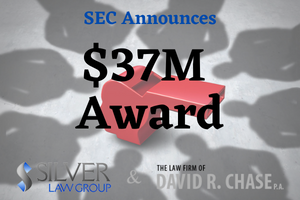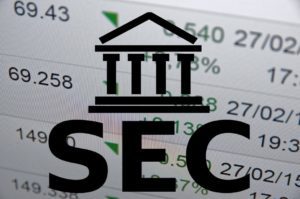 Private placements are a specialized kind of securities offering generally open only to accredited investors—for the most part, high net-worth individuals and licensed brokers. Given the investors’ sophisticated understanding of securities transactions, private placements are not subject to the same rigorous disclosure requirements as public offerings. Because of this lower disclosure requirement, it’s sometimes easier with private placements for bad actors to commit fraud. Continue reading
Private placements are a specialized kind of securities offering generally open only to accredited investors—for the most part, high net-worth individuals and licensed brokers. Given the investors’ sophisticated understanding of securities transactions, private placements are not subject to the same rigorous disclosure requirements as public offerings. Because of this lower disclosure requirement, it’s sometimes easier with private placements for bad actors to commit fraud. Continue reading
SEC And Another Agency Awards $37 Million To One Whistleblower
 In one of the largest bounties awarded to a single whistleblower, the SEC in conjunction with another federal agency awarded a total $37 million to a whistleblower for information that led to two successful enforcement actions. Continue reading
In one of the largest bounties awarded to a single whistleblower, the SEC in conjunction with another federal agency awarded a total $37 million to a whistleblower for information that led to two successful enforcement actions. Continue reading
How To Report Accounting Fraud To The SEC
 We often hear about accounting fraud when a big case hits the news. For example:
We often hear about accounting fraud when a big case hits the news. For example:
- Xerox falsified its financial records for five years, inflating its earnings by $1.5 billion;
- Lehman Brothers failed to disclose an accounting loophole that reported short-term loans as sales; and
- Haliburton improperly overbooked cost overruns.
When Investment Adviser Commissions, Markups, Or Charges Are Undisclosed
 It’s a well-known rule in “polite society.” One simply should not discuss money. And when it comes to asking someone to divulge their salary, Miss Manners has admonished, “It is unequivocally impolite to ask anyone how much money they make. Even if he really wants to know.” And so perhaps that helps unscrupulous investment advisers avoid disclosing their commissions, markups, or charges. But if you’re aware of advisers who are hiding this information from clients, consider coming forward to become an SEC whistleblower. Because, as we’ll discuss, it’s not about politeness. Willful failure to disclose their compensation may mean they’re failing to fulfill the fiduciary duties they owe their clients. Continue reading
It’s a well-known rule in “polite society.” One simply should not discuss money. And when it comes to asking someone to divulge their salary, Miss Manners has admonished, “It is unequivocally impolite to ask anyone how much money they make. Even if he really wants to know.” And so perhaps that helps unscrupulous investment advisers avoid disclosing their commissions, markups, or charges. But if you’re aware of advisers who are hiding this information from clients, consider coming forward to become an SEC whistleblower. Because, as we’ll discuss, it’s not about politeness. Willful failure to disclose their compensation may mean they’re failing to fulfill the fiduciary duties they owe their clients. Continue reading
Pre-IPO Fraud & Boiler Rooms (Part 2)
 In our last post, we were talking about how scammers are unfortunately robbing investors with claims that they can purchase pre-initial public offerings (IPOs). And how the Securities and Exchange Commission (SEC) and Financial Industry Regulatory Authority (FINRA), the not-for-profit overseeing broker-dealers, both effectively warn that, if someone’s not already an accredited investor, they should stay away from pre-IPO investing. It’s probably a scam. Continue reading
In our last post, we were talking about how scammers are unfortunately robbing investors with claims that they can purchase pre-initial public offerings (IPOs). And how the Securities and Exchange Commission (SEC) and Financial Industry Regulatory Authority (FINRA), the not-for-profit overseeing broker-dealers, both effectively warn that, if someone’s not already an accredited investor, they should stay away from pre-IPO investing. It’s probably a scam. Continue reading
Pre-IPO Fraud (Part 1)
 In May 2022, the Securities and Exchange Commission (SEC) announced that it had filed an emergency action to freeze the assets of StraightPath Venture Partners and other defendants. The SEC alleged that the defendants were committing ongoing securities violations, having already racked up $410 million from 2,200 defrauded investors. The defendants are said to have been running a large network of unregistered broker-dealers who sold shares of a pre-initial public offering (pre-IPO) that the defendants did not have to sell. Continue reading
In May 2022, the Securities and Exchange Commission (SEC) announced that it had filed an emergency action to freeze the assets of StraightPath Venture Partners and other defendants. The SEC alleged that the defendants were committing ongoing securities violations, having already racked up $410 million from 2,200 defrauded investors. The defendants are said to have been running a large network of unregistered broker-dealers who sold shares of a pre-initial public offering (pre-IPO) that the defendants did not have to sell. Continue reading
Unregistered Sales Agents And Boiler Rooms
 Securities sales is a hard business on a good day. And the pressure to sell and hit a quota is often hanging over many agents’ heads. That’s even more true when there’s a downturned market filled with skittish investors. But “boiler rooms” are another thing entirely. Typically run out of call centers filled with unregistered sales agents, boiler room scams convince unwitting investors into pouring money into worthless investments. And while boiler rooms are an old con, they’ve been getting recent technology updates that have law enforcement around the world taking notice. Continue reading
Securities sales is a hard business on a good day. And the pressure to sell and hit a quota is often hanging over many agents’ heads. That’s even more true when there’s a downturned market filled with skittish investors. But “boiler rooms” are another thing entirely. Typically run out of call centers filled with unregistered sales agents, boiler room scams convince unwitting investors into pouring money into worthless investments. And while boiler rooms are an old con, they’ve been getting recent technology updates that have law enforcement around the world taking notice. Continue reading
Infamous Financial Fraud Cases
 Financial fraud is a serious crime with heavy financial penalties and jail time. Yet people still try to mislead shareholders, bilking investors and destroying companies. Not every financial fraud case ends up on Netflix like biotech entrepreneur and Theranos founder Elizabeth Holmes. But many of the most notorious financial fraud cases are just as fascinating. Continue reading
Financial fraud is a serious crime with heavy financial penalties and jail time. Yet people still try to mislead shareholders, bilking investors and destroying companies. Not every financial fraud case ends up on Netflix like biotech entrepreneur and Theranos founder Elizabeth Holmes. But many of the most notorious financial fraud cases are just as fascinating. Continue reading
How Audits Help Detect Financial Fraud
 People often believe that audits can help root out fraud in cases and that an audit is a magic wand bestowing financial stability upon a company. But an audit is simply an independent examination of a company’s financial statements to ensure that its financial records are a fair and accurate assessment of its transactions. An audit is ultimately only as good as the information given to the auditors. Continue reading
People often believe that audits can help root out fraud in cases and that an audit is a magic wand bestowing financial stability upon a company. But an audit is simply an independent examination of a company’s financial statements to ensure that its financial records are a fair and accurate assessment of its transactions. An audit is ultimately only as good as the information given to the auditors. Continue reading
SEC Amends Complaint Against NS8 For Violating SEC Whistleblower Rules
 What does a fraudulent CEO do when he discovers a whistleblower in his company? In the case of NS8’s founder and CEO Adam Rogas, he impeded the employee’s access to company systems, raided his personal electronic accounts, prevented the employee from contacting the SEC and fired them once discovering that they were reporting the fraud. Continue reading
What does a fraudulent CEO do when he discovers a whistleblower in his company? In the case of NS8’s founder and CEO Adam Rogas, he impeded the employee’s access to company systems, raided his personal electronic accounts, prevented the employee from contacting the SEC and fired them once discovering that they were reporting the fraud. Continue reading
 SEC Whistleblower Lawyer Blog
SEC Whistleblower Lawyer Blog

